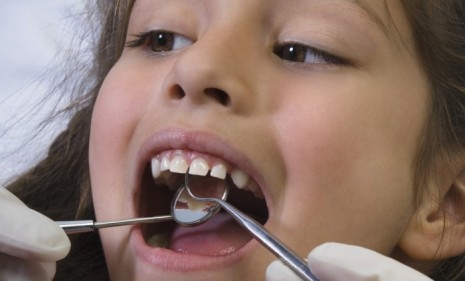Can a trip to the dentist poison your kid?
Common tooth sealants expose kids, and anyone else getting fillings, to the toxic chemical BPA. What's a parent to do?

A free daily email with the biggest news stories of the day – and the best features from TheWeek.com
You are now subscribed
Your newsletter sign-up was successful
Medical researchers have found that dental sealants contain compounds that, when mixed with saliva, degrade into the mysterious, toxic, estrogen-aping chemical BPA (bisphenol-A) — raising thorny questions for dentists and parents when it comes to preventing tooth decay. Here's a brief guide to the research, the recommendations, and the controversy:
How much BPA are we talking about?
Up to 88 times normal BPA levels were found in saliva right after a dental sealing, says Harvard pediatrician Dr. Abby Fleisch, the lead author of the study, published in the journal Pediatrics. After about three hours, the levels dropped quickly. The researchers don't know how much BPA is absorbed into the body.
The Week
Escape your echo chamber. Get the facts behind the news, plus analysis from multiple perspectives.

Sign up for The Week's Free Newsletters
From our morning news briefing to a weekly Good News Newsletter, get the best of The Week delivered directly to your inbox.
From our morning news briefing to a weekly Good News Newsletter, get the best of The Week delivered directly to your inbox.
Where does it come from?
Most tooth sealants now use chemicals that break down into BPA when mixed with saliva.
How many kids have been exposed to BPA-laced sealant?
Up to 40 percent of kids were treated with the sealant from 1999 to 2004 — and that percentage has almost certainly grown higher in the last six years.
A free daily email with the biggest news stories of the day – and the best features from TheWeek.com
So we've poisoned almost half today's kids?
Not necessarily. "People shouldn't be scared by this," says Dr. Burton Edelstein at Columbia's College of Dental Medicine, a co-author of the study. "The amount of exposure is extremely low." Fleisch's team found that dentists can reduce a child's exposure by rinsing out the patient's mouth with water or saline solution, and lightly sanding off excess sealant. Fleisch estimates that the amount of BPA from a sealing procedure is less than a child gets from plastic bottles and the lining of canned goods.
But BPA is harmful, right?
After a frustrating decade of research, scientists still aren't sure how dangerous BPA is to humans. In January, the FDA expressed "some concern about the potential effects of BPA on the brain, behavior, and prostate glands of fetuses, infants, and children." Other studies have found a correlation between BPA levels and heart and liver disease. But if it's harmful, we're all in trouble: The CDC has discovered measurable amounts of BPA in the urine of more than 95 percent of Americans.
Bottom line: Seal your kids' teeth or not?
Researchers, dentists, and even some BPA critics agree that the known risk of tooth decay is more dangerous than the possible risk of BPA poisoning. Fleisch's team recommends that pregnant women put off getting their teeth sealed until after birth, when possible, but that everyone else go ahead "with strict adherence to precautionary application techniques." But not everybody's convinced. "By this point, I have a healthy skepticism for expert opinions on matters such as this," says Sandy Maple in the parenting blog Babble. "Frankly, words such as 'don’'t know' and 'probably' don’t engender much confidence."
Sources: USA Today, CNN, MSNBC, Babble, HealthDay, New York Times, Medical News Today